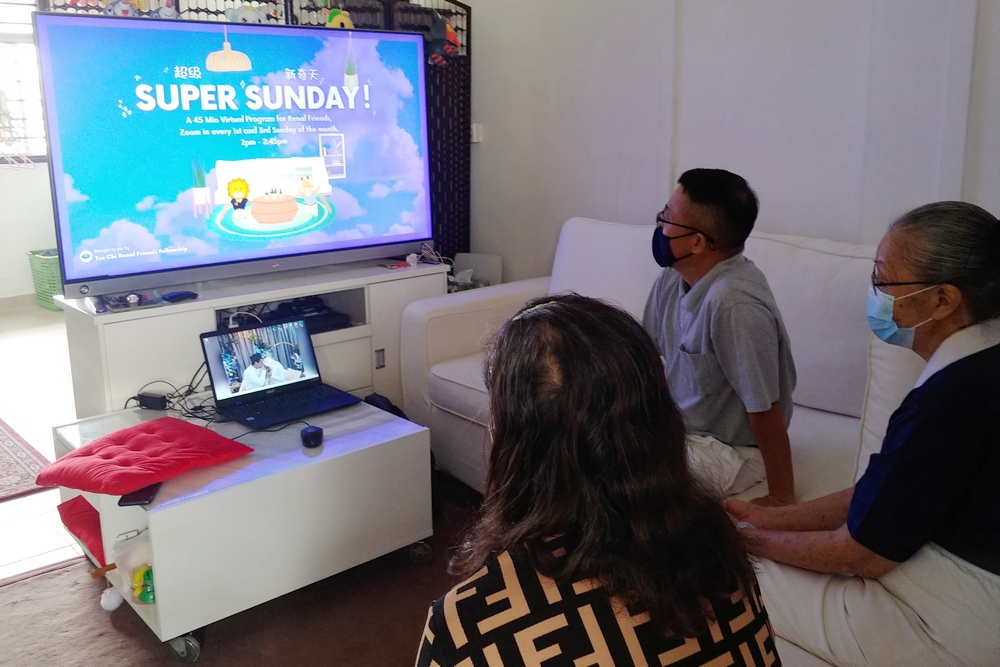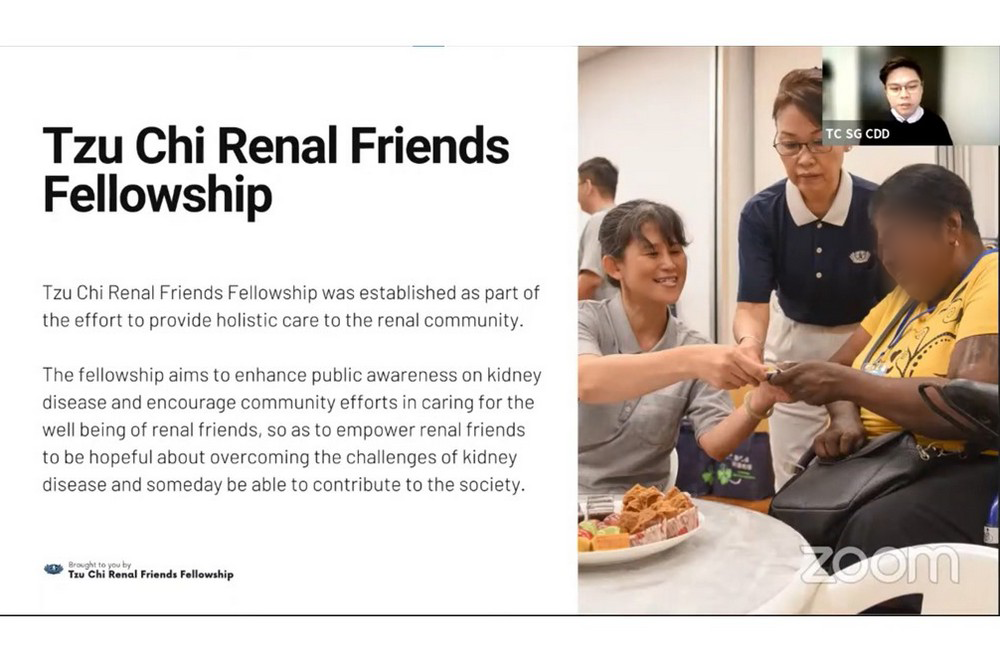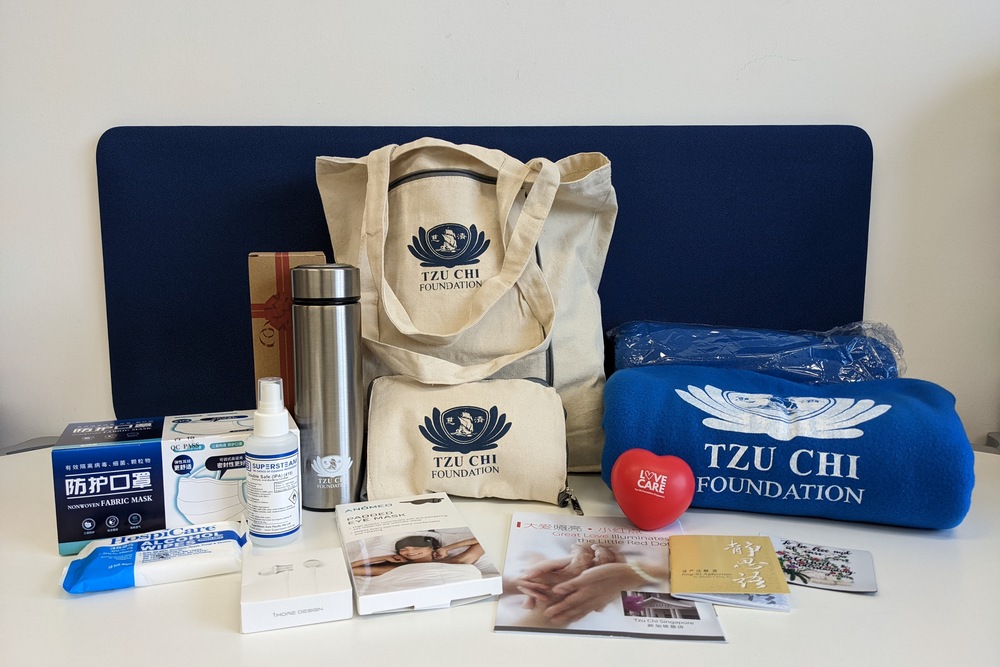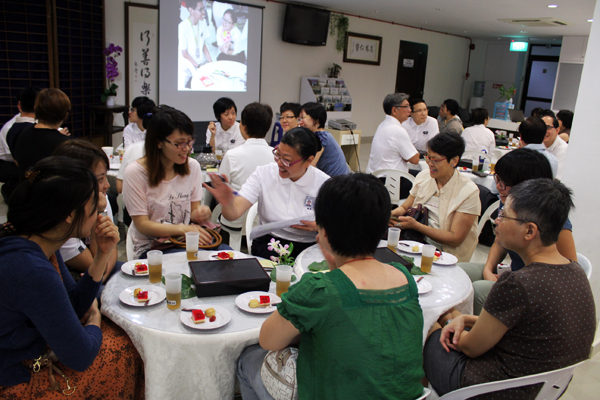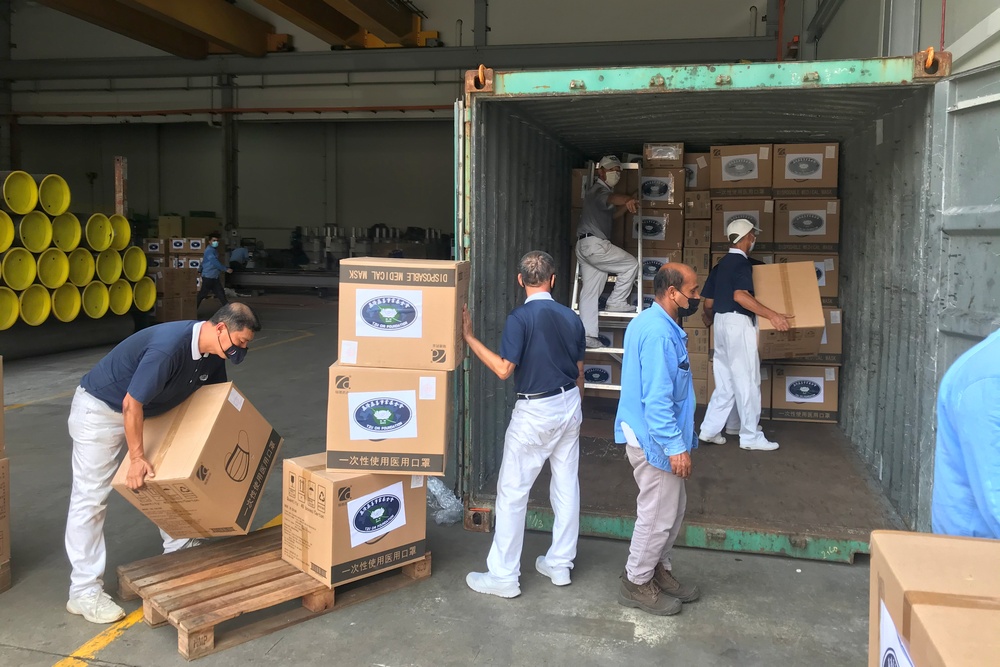Disclaimer: All activities depicted in this article were conducted in compliance with the COVID-19 rules and regulations at that given time.
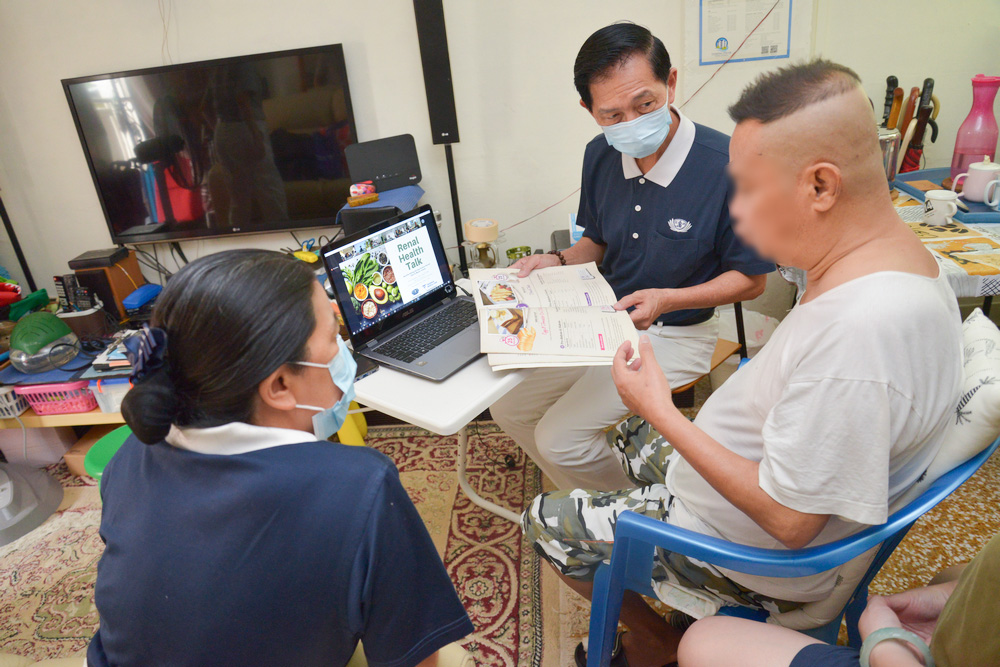
Tzu Chi volunteers sharing about the importance of renal health with an end-stage chronic kidney disease (CKD) patient. (Photo by Pua Poo Toong)
As a newly diagnosed end-stage chronic kidney disease (CKD) patient, it is often a reality that is hard to accept. Faced with the daunting prospect of being on dialysis for the rest of life coupled with the additional financial burden, it can be quite overwhelming. Besides the stress on the patient, the lives of family members around might also be affected as they assimilate into the roles of caregivers.
According to statistics from the National Kidney Foundation (NKF), six new patients are now diagnosed daily, an increase of three times compared to 20 years ago. Based on the Singapore Renal Registry Annual Report, there has also been an upward trend in the total end-stage CKD patient numbers over the same period. With more than 8,500 patients in Singapore at the moment, the situation is worsening at an alarming rate, and more has to be done to stem the tide.
Since 2005, Tzu Chi Singapore has been playing its part in supporting these patients. Termed as the Dialysis Assistance Programme, it was launched in April that year to provide a helping hand to needy patients regardless of race or religion. Tzu Chi discovered that some patients had to wait as long as two to three months for subsidised placement at voluntary welfare organisations (VWOs) after applying for dialysis subsidies. This wait could go up to six months now due to the current space crunch situation. As a result, they faced financial difficulties and had trouble affording the expensive treatments. With monetary aid from Tzu Chi’s interim dialysis assistance scheme, currently the only one in Singapore, they were able to tide through this transition period.
Besides this, dialysis transport assistance was also provided in the form of allowances for patients with mobility problems who were unable to afford the transport costs of travelling between their homes and the dialysis centre. Given the average monthly ambulance and taxi expenses of $1690 and $245 respectively based on this year’s figures, this scheme was a boost for eligible patients.
Aimed at providing more than just financial support, Tzu Chi’s renal care today has evolved into a more holistic form which covers most aspects of an end-stage CKD patient’s journey. Tzu Chi’s involvement starts off by providing financial and mental support during the transition period. For patients who might require more aid, they will be further assessed by the organisation regarding the possibility of becoming a long-term care recipient eligible for more support over a longer period. Tzu Chi’s very own renal dialysis centre is also on track to open in 2023, directly delivering dialysis treatment to needy patients. As for those who opt not to undergo dialysis, the organisation has also partnered with Sengkang General Hospital in a pilot programme to provide Renal Conservative Care (RCC) to eligible patients for three years starting May 2021.
Building on Past Efforts
With almost all bases covered, there is plenty to be optimistic about for Tzu Chi’s end-stage CKD beneficiaries going forward. But the organisation’s comprehensive renal care programme today has not been accomplished by chance. It is built upon the work that has been put in over the past two decades. And there have certainly been several significant milestones over the years.
In 2009, the first volunteer training aimed at improving the basic knowledge of volunteers on kidney disease and dialysis treatment was conducted by Tzu Chi Free Clinic. Subsequently in October 2012, Tzu Chi was invited to participate in an NKF meeting to discuss cross-organisational cooperation and how to make the best use of social resources. Then in 2015, the first partnership was established with an ambulance company to expand the range of transport allowance to three times per week. More ambulance companies have since come on board, with a total of 22 partners as of 2022. Lastly, in 2019, the first Renal Friends Gathering was organised for Tzu Chi’s end-stage CKD beneficiaries where useful knowledge about kidney diseases and healthy eating habits were shared.
 The first Renal Friends Gathering held in 2019 at Jing Si Hall involved 35 Tzu Chi Singapore’s end-stage CKD beneficiaries together with their family. (Photo by Cheng Lai Har)
The first Renal Friends Gathering held in 2019 at Jing Si Hall involved 35 Tzu Chi Singapore’s end-stage CKD beneficiaries together with their family. (Photo by Cheng Lai Har)
 Due to the pandemic, large-scale physical events have been a rarity. Last October, the second-ever Renal Friends Gathering saw the attendance of 52 end-stage CKD beneficiaries along with their family. (Photo by Goh Leay Ying)
Due to the pandemic, large-scale physical events have been a rarity. Last October, the second-ever Renal Friends Gathering saw the attendance of 52 end-stage CKD beneficiaries along with their family. (Photo by Goh Leay Ying)
Given the wide ranging nature of Tzu Chi’s non-monetary support towards its end-stage CKD beneficiaries in the past, one potential drawback could be that it might not be as targeted to meet specific needs. Thus, all the programmes were collated and restructured into a more streamlined and improved Renal Support Programme (RSP) in 2020.
Regarding the importance of the rejuvenated RSP, Mr Alex Chen, Tzu Chi Charity Development Associate explained: “Tzu Chi has supported needy patients for 17 years since its beginning in April 2005. We know this support is essential because patients rely on dialysis for survival. As such, the need to deal with the multi-faceted issues that patients face during the early phase of adjustment to their dialysis treatment makes the RSP very crucial.”
Through the three main goals of the RSP, the organisation hopes to deliver quality care for its community. The first goal would be to provide psycho-social and emotional befriending support to recipients and their families. In order to achieve this especially in the midst of the COVID-19 pandemic, activities such as “Super Sunday” as well as the “Renal Friends Fellowship” telegram channel were introduced.
The launch of the various initiatives has seen promising results. With “Super Sunday”, it managed to reach out to more than 100 people through virtual sessions where healthcare professionals were invited to share health tips or guide sessions of mindfulness practice. As for the telegram channel, its content is specially curated for renal patients, with an aim to introduce positivity using different themes and messages. Till date, there are more than 150 subscribers, many of whom are volunteers eager to find out more about how to better care for the renal care recipients that they are assigned to.
Other than the area of befriending support, training is another integral goal of RSP. The aim would be to have sufficient trained personnel to case manage the medico-social issues of recipients. To achieve this, there have been 13 training sessions organised for staff and volunteers over the past two years, where professionals were engaged to educate them in the area of renal care. Lastly, the third goal of RSP would be to continue providing support to at-risk beneficiaries and their families even when they no longer require monetary aid. From February 2022, the interim period of non-monetary support was extended from three to six months.
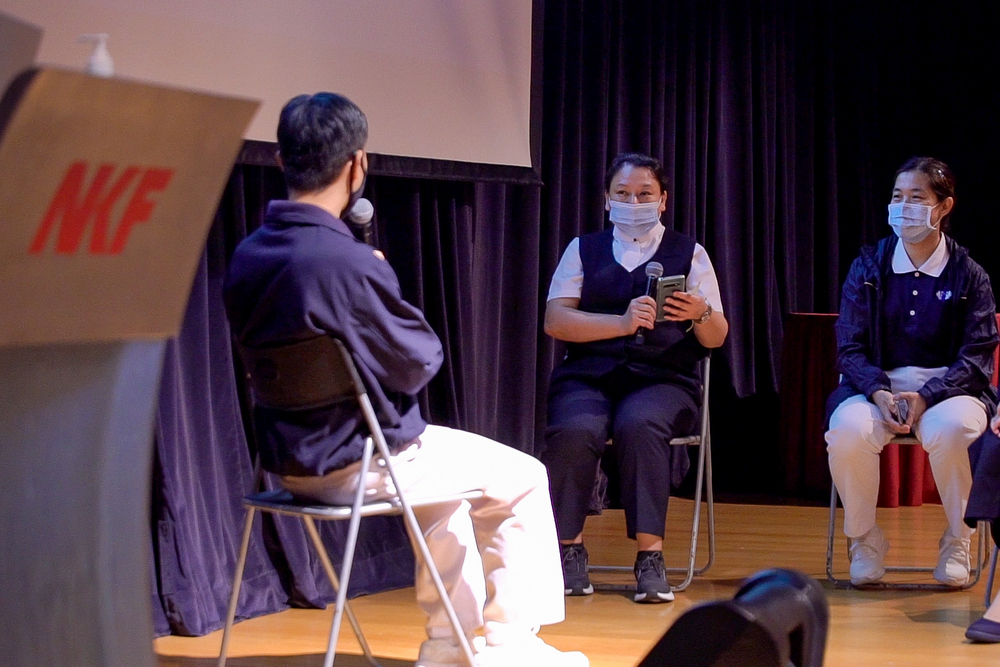 Volunteers and staff attended customised training sessions to learn how to better care for end-stage CKD patients. They were conducted by professional social workers from long-term partner, National Kidney Foundation. (Photo by Chen Ya Yin)
Volunteers and staff attended customised training sessions to learn how to better care for end-stage CKD patients. They were conducted by professional social workers from long-term partner, National Kidney Foundation. (Photo by Chen Ya Yin)
Going Beyond a Supporting Role
Having done well in its role of providing support to the end-stage CKD patients over the years, the organisation has now progressed towards delivering direct medical care through its upcoming renal dialysis centre and ongoing RCC programme.
The dialysis centre is slated to open in the north-east of Singapore, with an aim to fill an existing gap in the current non-profit dialysis centre landscape. Given the rising number of patients and an imminent “kidney tsunami”, there are increasingly insufficient centres around, and it has resulted in patients needing to travel long distances for their regular dialysis sessions. Thus, upon the recommendation by the Ministry of Health, Tzu Chi has made the decision to set up a centre at Buangkok Crescent.
According to the proposed plan for the centre, it will be split into two main functions. While providing quality haemodialysis treatment for the patients is a given, there will also be a segment of the centre set aside for educational and renal support activity purposes. Through these two functions, the centre hopes to be a more well-rounded establishment, rather than just one solely focused on treatment.
To cap off the holistic renal care from Tzu Chi would be the RCC programme. Having been running for more than a year now, it has enabled patients who have opted for this form of care to lead a higher quality of life. Under the watchful eyes of Tzu Chi’s community nurses who would visit the patients regularly, their conditions are monitored meticulously, ensuring that their symptoms remain well-controlled. Additionally, the nurses assist end-stage CKD patients in advance care planning (ACP) and also provide psychosocial support to them and their families. The programme has so far managed to reach out to 67 patients as of end October 2022.
Tzu Chi community nurse Ms Ester Koh (right) helping to take the blood pressure of her RCC patient as part of her routine visit at his home. (Photo by Chan May Ching)
Tzu Chi’s overall support for end-stage CKD patients has been a rather comprehensive one, covering most aspects of the journey that they have to go through upon being diagnosed. In terms of monetary support covering both interim and transport dialysis assistance, over 3,600 beneficiaries have benefited from the disbursement of more than eight million dollars in financial aid as of end August 2022. For some of the more needy beneficiaries, they have become Tzu Chi’s long-term care recipients, receiving further support - both monetary and non-monetary. As of August 2022, end-stage CKD beneficiaries make up around 15% of the organisation’s total number of care recipients.
Feelings of loss and despondence are just some emotions that end-stage CKD patients might encounter upon being diagnosed. Given the huge disruption on their lives caused by the illness, it is not something that everyone can truly comprehend. But with Tzu Chi gradually moving towards having a more holistic programme targeted specifically at these end-stage CKD patients, it has provided them with some form of relief. As they continue to try uplifting their lives in the midst of their toughest challenge yet, the presence of Tzu Chi as one of the many helping hands in the renal care community can hopefully help them through even the darkest of storms.

